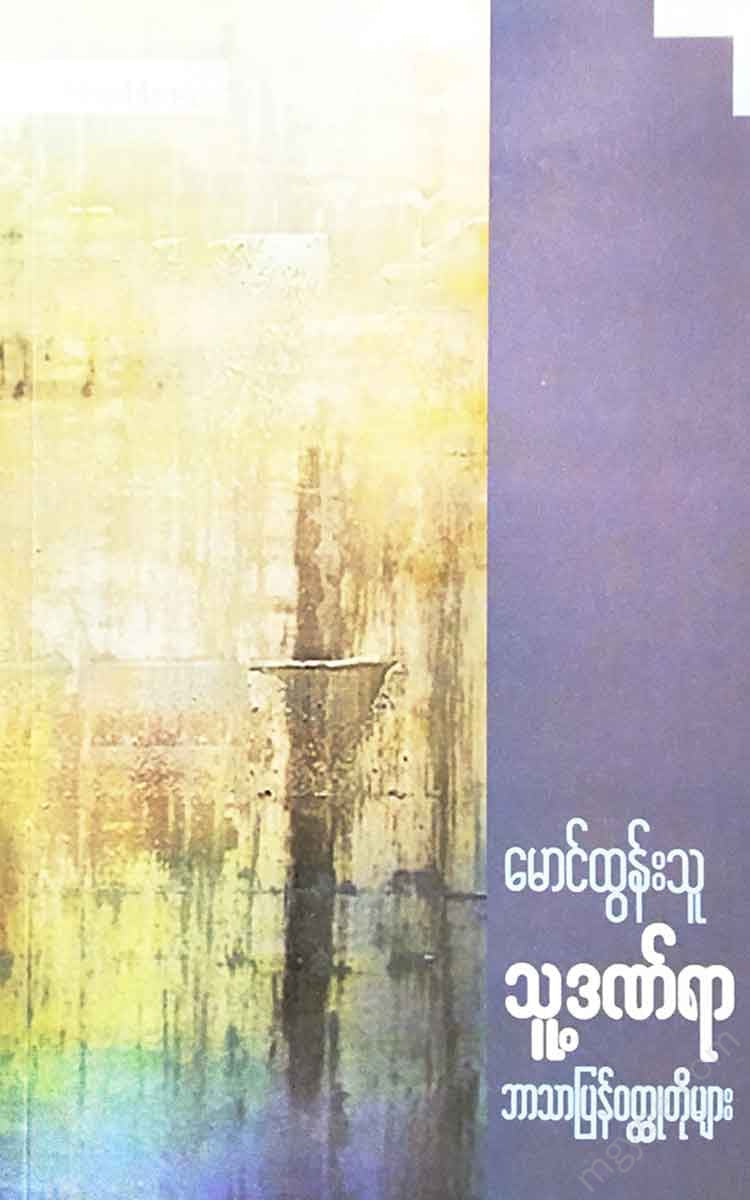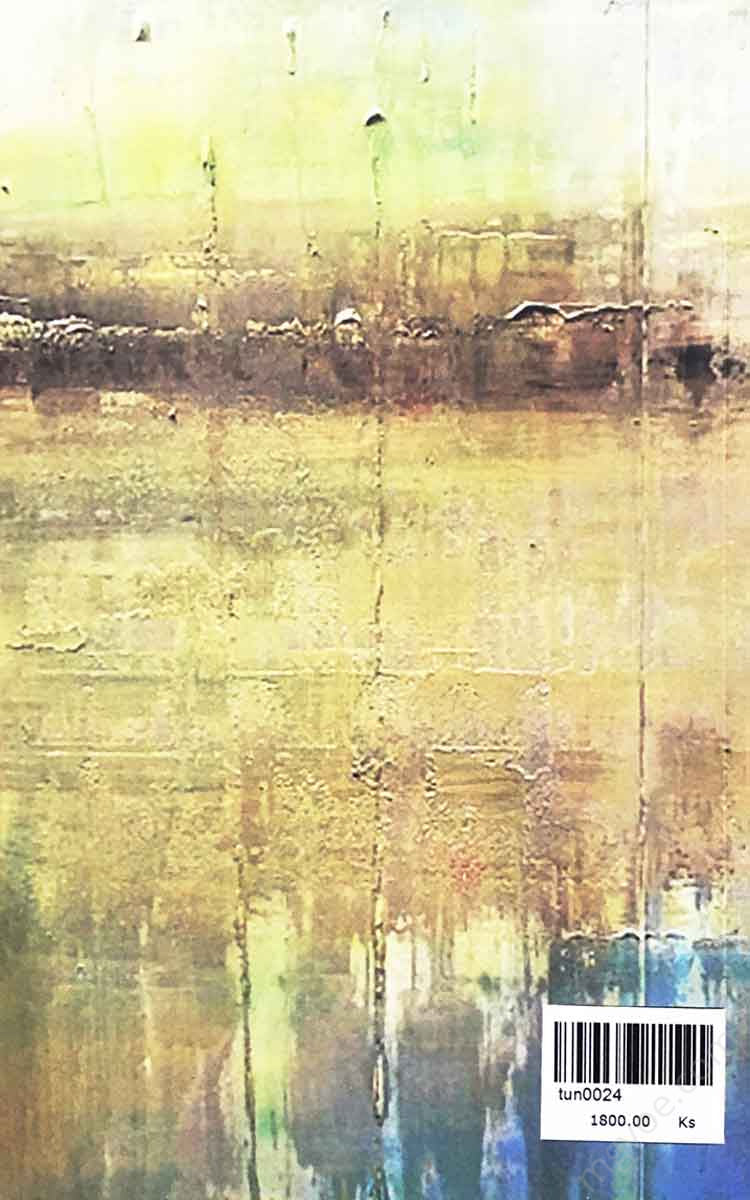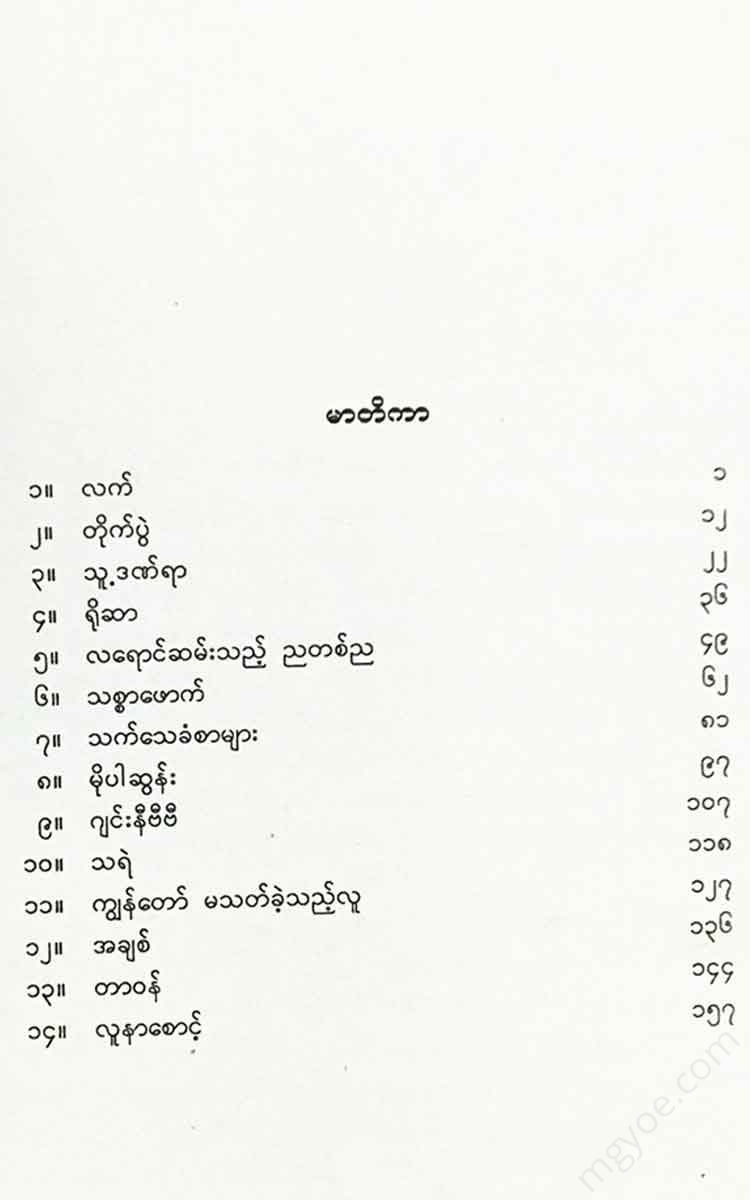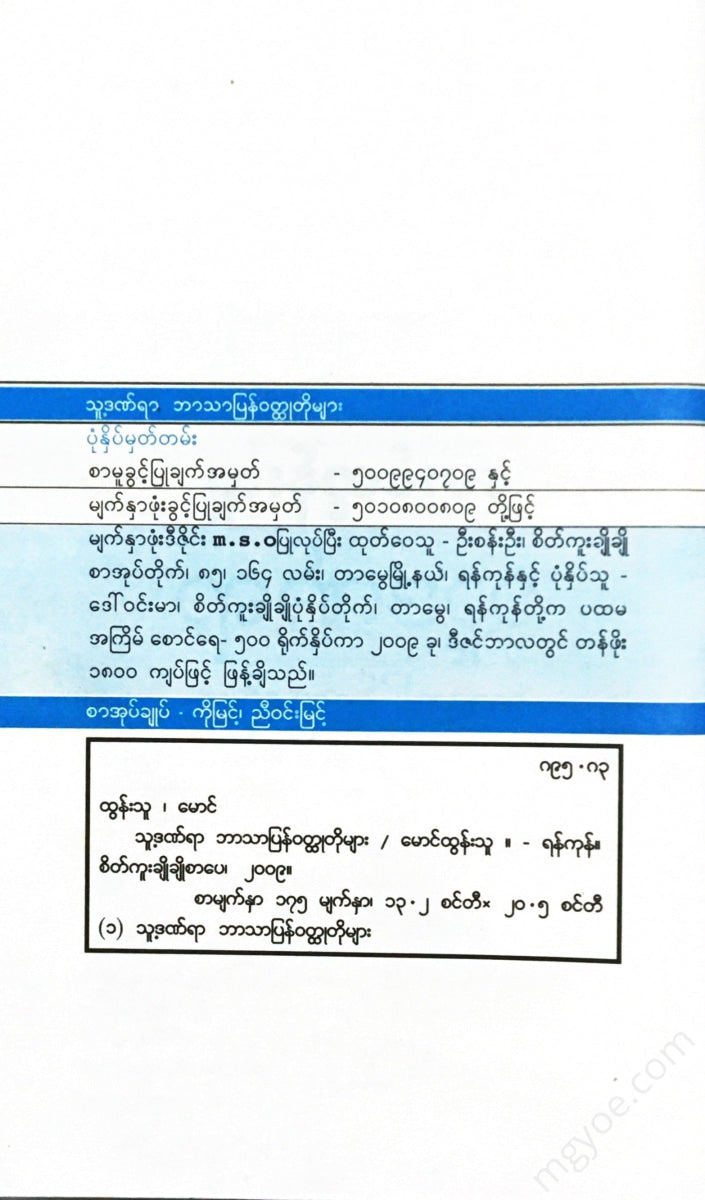စိတ်ကူးချိုချိုစာပေ
Maung Tun Thu - Short stories translated by Thu Kaung
Maung Tun Thu - Short stories translated by Thu Kaung
Couldn't load pickup availability
Hand
Guy de Maupassant was a follower of Gustave Flaubert. He copied his teacher's novels, which led to his novels being somewhat unconventional. However, after about seven years of writing, he became an independent writer.
His first short story, Bole de Skif, was recognized as a masterpiece. World literary scholars have considered it Maupassant's masterpiece. Now, The Hand is also considered one of his best works of suspense, making it a unique short story.
* * *
We were all sitting around the judge, Monsieur Barmutier, who was giving his opinion on the affair at Saint-Cloud. The case, which could not be explained by reason or explanation, had shaken the whole of Paris for a whole month, and no one had yet appeared who could solve its deep mystery. Monsieur Barmutier, sitting erect with his back to the fire, was systematically presenting and discussing from all angles all the obvious facts that could be considered as evidence, but he could not extract a final answer.
Several women rose from their seats and stood near him. They stared intently at his lips as the important words came out. The words shocked them. They astonished them. They had heard them, but the desire to hear more was urging them on. One of them broke the silence.
"The incident is so terrifying, it almost seems supernatural, and I don't think we'll ever know for sure."
The judge turned to the woman.
“Well... you're right, madam, we'll have to find out everything from the beginning to the end, but the word "supernatural" you used earlier doesn't really make sense in this case.
“We had a case that was easy to imagine, and the case was shrouded in so much mystery that it was impossible to penetrate the circumstances surrounding the case and find out. But as time went on, I thought about it and found some things that could be connected. In any case, we had to abandon it, thinking that we would not have enough information to solve the case.”
Then one of the women in the group asked, “Tell us about that incident.” Monsieur Yabamutia smiled with a serious face and continued to tell the story that the woman had been wanting to tell.
* * *
Now, don't think that I'm going to add anything supernatural to the story I'm about to tell you, I'm not a person who believes in supernatural things.
But here, instead of using the word “supernatural” that we don’t understand, we should use the word “inexplicable.” That would be better.
Anyway, the main point in the story I'm going to tell you now is the environmental conditions, I'm talking about the environmental conditions that came upon me and affected me. In short, the actual facts of the incident are...
At that time I was the local magistrate of a small white town called Ajaccio. The town was situated on a very beautiful bay on the border, surrounded by high mountains.
The cases I hear most often are those of revenge killings, some of which are quite dramatic, some of which are fictional, and some of which are quite brutal and brutal.
For two years I heard nothing but bloodshed. Every day I listened to the terrible consequences of the Corsican law. This law allowed for the generational revenge of those who had done wrong. For me, I saw and heard only the death of old men, children, and close relatives, brothers and sisters, uncles and aunts, whose throats were slit.
One day I heard of an Englishman who had rented a little house on the edge of the bay for many years, and who, on his way to the island, entered the port of Marseilles and was accompanied by a Frenchman, and soon everyone was talking about this strange Englishman.
This man lives alone at home, only goes out to hunt and fish, doesn't talk to anyone, never comes into town, spends two or three hours every morning practicing pistol and rifle shooting, and that's why people say he's a bit of a weirdo.
Stories about him spread among the people. Some said that this man was a very prominent person, that he had fled for political reasons, others said that this man had committed a very terrible and brutal crime and was hiding here. They even went into detail about the terrible and terrible crime.
As a judge, I was very curious about this man. But I knew nothing about him, and he gave his name as Sir John Rowell. | So I could do nothing but watch him closely. But, to be honest, I had no suspicions about him, so my interest was very small.
Anyway, the rumors about him were that he was a man of three thousand pounds. People kept talking about him, so I decided to go and see this man myself. So I organized myself to go hunting regularly in his area.
I had been waiting for a long time for the opportunity I had planned. Finally, the opportunity came when I threw a bird under his eyes. When I threw it, my dog picked it up and brought it to me. I took the bird and went to him, I accepted the dead bird and apologized for my actions.
He was a very large man, with red hair, a red beard, and a very tall man; but he was a very polite Herculean man, without the British manners. He thanked me when I spoke French, and in about a month we had met in person for the fifth time.
One evening I finally went to him, and he was sitting in a chair in the garden of his house, smoking a pipe. I bowed to him and said hello, and he invited me for a beer, and I didn't have to ask twice.
He treated me with the courtesy of the English, welcoming me in both French and Corsican, and said he liked both languages.
I asked him about his life and what he had done, out of curiosity.
He answered all questions calmly and said with a laugh that he had traveled extensively in Africa, India, and America.
"Oh my... I've had a lot of adventures," he said, laughing heartily.
Then I talked about sports, and he told me about shooting hippos, tigers, elephants, and gorillas.
"Those creatures are very scary creatures."
I said, and he smiled and said,
"No. Man is the worst."
And he laughed, he was laughing so much that he was very satisfied with what he said.
“People are often among the victims I hunt,” he added.
Then he talked about weapons. He invited me to see the rifles in his house, his room decorated with black silk and gold curtains, and yellow flowers, he said, all the equipment was Japanese.
A strange object on a shelf in the middle of the room caught my eye, a black object draped against a red velvet backdrop. As I approached, I saw that it was a human hand.
The hand was not a bone hand. It was a dry, black hand. The nails were yellow, the veins were protruding, and you could even see the dried blood. It was a hand that had been cut off with an axe, close to the elbow.
There was a chain on his wrist. I asked, "What is that?"
"He is my most feared and dangerous enemy."
The Englishman replied,
"This hand came from America, was cut off with a knife, and then dried in the sun for a week."
I touched the hand and examined it. I thought it must be the hand of a large, muscular man. Not only were the fingers extremely long, the tendons were very large, and the hand was terrifying to look at. It was obvious from looking at this hand that it was an act of extremely cruel revenge.
“I think he must be a very strong and muscular man,” I said.
"Yes," the Englishman replied calmly.
"But I was able to show that I was stronger than him, that chain was tied to a human hand myself."
Thinking he was joking, I replied, "What use is that chain now? I don't think my hand will try to free itself."
"The hand always wants to come out, that's why the chain is still needed," replied Sir John Rowell, with a very serious face.
I glanced at his face. Have I met a fool, or is he just joking?
His expression was calm and composed, as if nothing had happened, and I changed the subject.
I admired his guns in amazement, but what was special was that he kept three revolvers loaded with bullets in his room. This man probably had a fearsome enemy who could attack him at any time.
I visited him many times. Later I stopped going, his presence became a habit for us, he was no longer an interesting person to anyone.
And so a year passed, and towards the end of November my servant woke me one morning, and told me that Sir John Rowell had been murdered the night before.
About half an hour later I entered the Englishman's house with the King and the Chief of Police, his servant was weeping and wailing at the door. At first I suspected the man, but the servant was an innocent man, and we were unable to find the murderer at all.
When I entered Sir John's living room, the first thing I saw was his body lying face down in the middle of the room. His shirt was torn, and one of his sleeves was torn and hanging down. It was obvious from the scene that a very terrible and violent fight had taken place here.
The Englishman had been strangled to death. His dark, swollen face showed signs of extreme terror, he appeared to have bitten something with his teeth, and his neck bore five puncture wounds from a sharp-edged weapon, and his entire neck was covered in blood.
A doctor came to us, and as he was examining the body, he was particularly interested in the fingerprints on the dead man's skin, and then he made a strange remark: "I think it was strangulation from a bone."
A shiver ran down my spine. My gaze immediately went to the wall where the skin-covered, bone-like hand was hanging. The hand was no longer in its place. The chain was broken and dangling.
Then I looked down at the body. I could see a finger in its mouth, bitten off by its teeth. The missing hand was a finger. It had been bitten off by its teeth from the second joint.
An investigation was conducted. Nothing was found. No door, no window, no furniture, no signs of damage, and no sign of the two dogs waking up.
According to the servant, he had noticed that his master was becoming restless about a month ago. He had been receiving many letters from his master. He had seen him burn all the letters he received.
Later, his master was often seen swinging his shriveled hand angrily with his whip. In the hours after the incident, the hand was nowhere to be seen. No one could say how it had moved.
He went to bed very late, and when he did, he locked the door from the inside. He kept his guns within arm's reach, and often at night he heard his master shouting and talking loudly. It was like someone was arguing with someone.
That night, nothing was heard from him. The servant opened the windows only after he found Sir John's body. There was no one he could blame.
I told the authorities everything I knew about the dead man. The investigation spread throughout the island. The islanders saw nothing. Three months after the incident, I had a very scary experience one night. It was me. I think I saw a “hand.” It was crawling along my curtains, my blinds, and my walls like a scorpion. I went back to sleep three times. Three times I saw a very disgusting and extremely ugly hand. It was moving using its fingers as if it were legs.
The next day they brought the hand to me. They found it on his map in the cemetery where we buried Sir John Rowell's family, unable to find it. I couldn't put my finger on it. That's my story. I don't know anything else.
* * *
All the women were trembling. Their faces were pale with fear.
One said, “This story never ends.” “If you don't tell us as much as you can about what happened, we won't be able to sleep through the night.”
The judge smiled.
"I'm afraid I'm going to ruin your scary dreams. Because I think this is what happened. The real owner of the hand is a dead man. He searched for his hand with his remaining hand. When he found the hand, a "revenge" was naturally triggered. But I don't know how he got there."
A woman muttered. "No, that can't be happening."
“I told you, you won’t be satisfied with my explanation,” the judge smiled as he finished speaking.
The Hand by Guy De Maupassant.
Sweet idea







